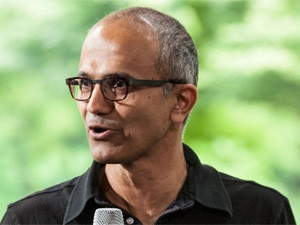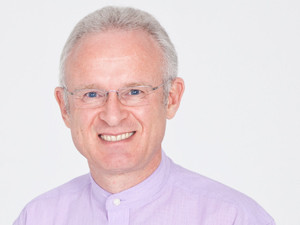
As support for one of Microsoft's most popular operating systems comes to an end today, the company is radically transforming itself to take advantage of mobility and the shift to cloud computing in a new era.
The software giant recently made several big announcements that impressed with the speed with which they landed under new CEO Satya Nadella, who became the company's head in February.
Microsoft was founded in 1975 and has often been criticised for being behind the times, having missed the mobile revolution under former CEO Steve Ballmer's watch. However, the company is now revolutionising itself on the back of its cloud platform.
Several announcements have come out of its recent Build conference, which led to its stock price reaching a 14-year high. Microsoft's recent news includes that it is giving away Windows to makers of smartphones and small tablets for consumers, which followed its announcement of Office for iPads.
But wait, there's more
Liron Segev, Swift Consulting CEO and tech blogger, writes that Microsoft has made three other big changes. These include opening Windows to developers and hardware hackers so they can build apps and platforms, without charging; making tiles optional instead of obligatory; and launching - in beta in the US - Cortana, which is Microsoft's answer to Siri and Google Now.
The software giant is also taking on Apple in the car space, with news that it has developed a touch- and car-friendly interface that allows Windows devices to mirror what is on-screen.
World Wide Worx MD Arthur Goldstuck says Microsoft is showing it understands the game is not about providing for hardware anymore. He says while the developments were some time coming, it is impressive how much has come to the table under Nadella's watch.
Goldstuck says Office for iPad was expected, but the announcement of free Windows for smaller devices was a "shocker" and shows it is having a "dramatic awakening to the nature of the new world" in which apps are free.
This requires a "radical" mind shift, which may not have been possible under Ballmer, says Goldstuck. He says it is symbolic that these shifts come under Nadella, as it highlights his - and the company's - intention to be relevant to this decade, which is characterised by an increasing number of mobile devices and "appification" of software.
Microsoft is remodelling to compete with the likes of Apple, Google and Amazon off the back of its leading cloud and virtualisation offerings, says Goldstuck.

Segev says all these shifts, which come just as support for XP ends, show the company has woken up to the fact that it has been a "big sleeping giant" that has rested on its laurels. He says Microsoft is now becoming a "hungry start-up" that he can see making acquisitions as it moves to play in the 'Internet of things' space, much like rival Google has.
Microsoft certainly has the cash to make acquisitions, as it ended the second quarter with $10 billion in the bank. However, Goldstuck says Microsoft does not have the culture that easily absorbs outside entities, although he would not be surprised if deals were struck.
Although many of these innovations would have been in the pipeline before Nadella became its head, it seems Microsoft has accelerated its development process, says Segev. He says the company wants to be the "new kid on the block" and has laid the groundwork to be more than just an OS and Office suite provider.
Goldstuck says this is an exciting period for Microsoft, although he is concerned that SA will once again remain a poor relation globally when it comes to benefit from the shift, as has been the case with the late launch of Xbox - a year after its international arrival - and Microsoft's failure to bring Surface to the local market.
Bye, XP
Microsoft's shift marks the beginning of a new era as support for XP ends today. According to PC World, the 12-year-old OS, which is still used on nearly 30% of Internet-connected PCs, will no longer be able to be updated via security patches.

Segev says XP was extremely popular among users, although it was a radical change from Windows 95. In September 2007, Microsoft said, based on feedback it has received for the OS, it would extend the availability of Windows XP editions among original equipment manufacturers and retail channels for an additional five months to June 2008.
It would also continue to offer Windows XP Starter Edition in emerging markets where it was available for the rapidly growing class of hardware-constrained ultra-low-cost PCs until June 2010.
Development of Windows XP began in the late 1990s, notes Microsoft. Most of the giant's software is supported for 10 years.
Important dates
Date | Event |
1975 | Microsoft founded |
August 1981 | IBM introduces its PC with Microsoft's 16-bit operating system, MS-DOS 1.0 |
March 1986 | Microsoft stock goes public |
August 1989 | Introduces earliest version of Office suite of productivity applications |
May 1990 | Launches Windows 3.0 |
August 1995 | Launches Windows 95 |
June 1998 | Launches Windows 98 |
January 2000 | Steve Ballmer named president and CEO |
February 2000 | Launches Windows 2000 |
October 2001 | Launches Windows XP |
November 2001 | Launches Xbox |
November 2002 | Microsoft and partners launch Tablet PC |
April 24, 2003 | Launches Windows Server 2003 |
October 2009 | Launches Windows 7 |
November 2010 | Launches Windows Phone 7 |
June 2011 | Launches Office 365 |
October 2011 | Microsoft closes its acquisition of Skype |
October 2012 | Launches Windows 8 and Microsoft Surface, and Windows Phone 8 |
January 2013 | Launches Office 2013, expands Office 365 |
February 2013 | Launches Outlook.com |
November 2013 | Launches Xbox One |
February 2014 | Satya Nadella named as Microsoft CEO |
Source: www.microsoft.com
Share